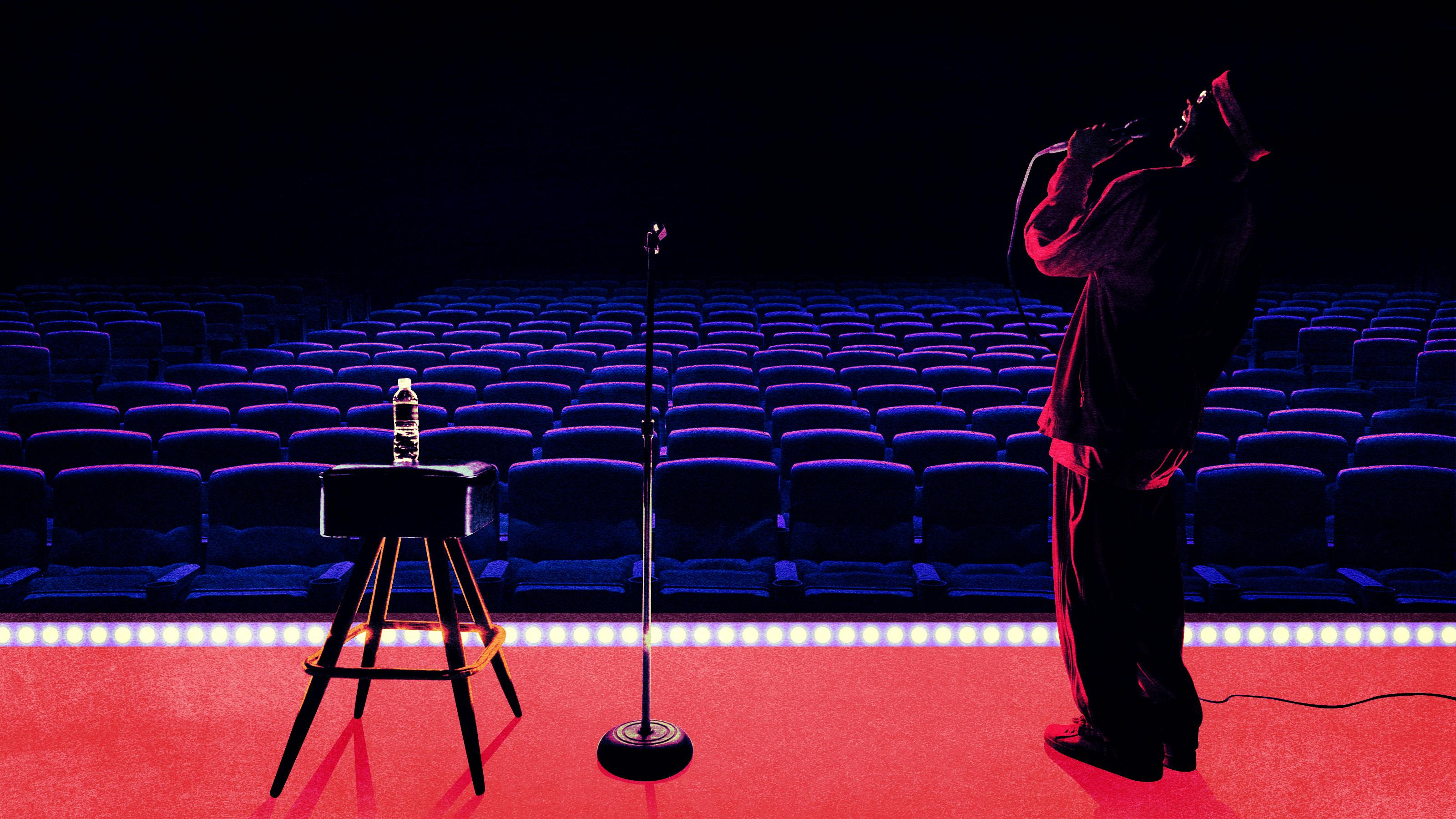The Elephant in the Empty Room: How Social Distancing Has Changed Stand-up Comedy
Coming together to laugh in the wake of tragedy is a long-held American tradition. With the spread of the coronavirus making that practice impossible, comics around the country have been forced to adapt and find alternative avenues.
On September 12, 2001, comedian Roy Wood Jr. performed at a small venue in Mississippi. During his set, a nearby television was showing coverage of the previous day’s terrorist attacks. “The bar still had the news on and over in the corner there’s jokes,” says Wood, who’s now a Daily Show correspondent.
For the young comic, it was a difficult evening. “You could do a joke and it would land,” says Wood, “and then half the crowd would just look over at the TV and see an explosion and it was back to zero again.” But at least back then there was an audience to even attempt to entertain. Now the crowds are gone. “On 9/11, it was, ‘Do I have it in me to laugh?’” Wood says. “Whereas now it’s, ‘Should I even leave the house?’”
The spread of the coronavirus has forced some of the country’s most well-known comedy clubs to close indefinitely. Stand-ups, the majority of whom rely heavily on income generated on the road, are facing a terrifyingly unprecedented work stoppage. “If all of our gigs get canceled within the next month or two, a lot of us are really fucked,” says comedian Marcella Arguello, who appeared on the second season of HBO’s 2 Dope Queens and last year released her first album, The Woke Bully. “To lose one gig, you’re like, ‘Oh that’s fine, the next gig will get me. I’ll just be sure to bring merch, or whatever.’ But to lose weekend after weekend after weekend?”
While the entire entertainment industry is on the verge of completely shutting down, comics are dealing with a uniquely devastating problem. Unlike music, movies, or TV, stand-up comedy requires live feedback. “We’re the only art form that actually needs a crowd to complete what we’re doing,” says comedian Laurie Kilmartin, a writer on Conan. “You can write a bunch of jokes, that’s fine, but you don’t know if they’re gonna work till you’re in front of strangers. So it really messes things up. The tighter the crowd is, the better the show. The audience feeds off each other’s energy.”
“This is what I was talking about with a comic friend,” says comedian Josh Gondelman, a writer and producer on Desus & Mero who recently had to cancel his scheduled Boston performances. “If the shows are packed, then it’s worse for public health and better for the shows. And if there’s 18 people at a show, and they’re spread out, and each one has that social distancing, 6 feet on all sides, then it’s gonna be a terrible show but a lesser risk.”
The halt of stand-up comedy pales in importance compared to the growing shortage of hospital beds, of course, but the fragile state of the industry is yet another example of how profoundly the spread of the virus has disrupted American life. Nothing lies untouched. The act of coming together to share a few laughs in the wake of tragedy is a long-standing American tradition. Think Lenny Bruce breaking the tension on stage soon after the Kennedy assassination by saying JFK impersonator Vaughn Meader was “fucked.” Or Gilbert Gottfried at the Friars Club roast of Hugh Hefner making a 9/11 joke and winning the crowd back with “The Aristocrats.” But right now, such catharsis is impossible. “You can’t even come together,” says comedian and actor Chris D’Elia. Not during a pandemic. “It’s definitely the elephant in the room,” Arguello says, “and the room isn’t filled with anybody.”
Comics, it should be noted, do have places to tell jokes. There are multiple digital platforms on which they can share videos of themselves being funny. But posting on social media, while useful promotionally, doesn’t pay the bills. Performing does. Stand-up remains the most reliable way for comedians to make money. And now there are no shows left to promote.
“Most of my exposure is at this point on TikTok and Instagram but there’s no money in that,” says longtime touring comedian Liz Miele, who has made several appearances on Comedy Central. “The money I make from going viral is people going to live shows. My financial well-being is live shows.” Specifically, shows on the road. “The reason we travel is that you can’t really make a real living and live in New York City with New York City rents, by just doing city spots. Really, the city spots are kind of to keep you sharp and to experiment. But the reason comics tour, whether they’re famous, budding like I am, or starting out, is to pay the rent.”
With live shows disappearing, those without alternative avenues find themselves left hanging. “When all of a sudden that’s gone, it’s a sock in the gut,” says former Conan warm-up comedian Jimmy Pardo, host of the Never Not Funny podcast. “I can’t imagine being a young comic when that’s the only income coming in.”
Comedian Akeem Woods was scheduled to open for Godfrey at the Ontario Improv in California. On March 12, those six performances were canceled. The financial impact was even greater because he had bought hundreds of dollars’ worth of T-shirts to sell at those shows. Within days, the rest of his March gigs were nixed. All told, the loss of nearly a month of work cost Woods about $5,000. Clubs have offered to rebook whenever social distancing ends, but there’s no short-term relief. “That’s cool,” says Woods, “but I can’t reschedule my phone bill for August.” To make some extra cash, he recently took a part-time job with the 2020 Census.
Before the current rash of cancellations, comic and writer Jim Tews managed to squeeze in two gigs opening for Kyle Kinane in Hamden, Connecticut, and Ithaca, New York. The occupational hazards of comedy at the moment are not lost on him. “So glad I chose to make my living sharing microphones in poorly ventilated rooms full of strangers who *hopefully* liked me enough to shake my hand and buy merch with damp cash when I’m done,” he tweeted shortly after midnight on March 12, hours after the NBA postponed its season. It was, of course, a joke. But it was also the truth. “Literally, I need to sell some pins and download codes,” Tews says. “To lose out on $250 of merch sales a night because I don’t want to shake hands or take cash? I don’t know what the fuck to do sometimes. Because this is my rent.”
And it’s not just comics who are being affected by closures and cancellations. Comedy clubs employ dozens of people, including security workers and waiters. Keeping venues open would put them at risk—“The audience, and the low ceiling, and everything that would keep the coronavirus alive also makes for a great crowd,” Kilmartin says—but closing them is disastrous in a different way. Last week on Facebook, DC Improv owner Allyson Jaffe announced that she had laid off 50 people—nearly her whole staff.
As of Tuesday, Chris D’Elia hadn’t been on stage for a week. In the past 14 years, the longest he’s gone without doing stand-up is 14 days. To pass the time he watched Outbreak, which he says was oddly soothing, and was even moved to chat with other comedians on the phone. “One of them said, ‘I need to talk to someone other than my family,’” he says.
Many comedians can be antsy by nature. Even before the coronavirus, a lot of them already felt that they weren’t working enough. “Our lives are centered around being on stage and being in front of people,” says D’Elia, whose new Netflix stand-up special, No Pain, will be released on April 14. “In a lot of ways it’s the most important thing that we do. Being at home and being a quote-unquote normal person is not what we do.”
D’Elia knows that he’s “one of the lucky ones” with sources of income beyond stand-up. He’s understandably more concerned about the comics who have opened for him, Michael Lenoci and Craig Conant.
“Because we aren’t full-time employees, we can’t collect unemployment and a lot of people don’t have benefits,” says Marianne Ways, a live comedy producer and casting director who this month halted her weekly Brooklyn show Butterboy, which is hosted by Jo Firestone, Maeve Higgins, and Aparna Nancherla. “It’s a scary-ass time right now. The minute I decided to shut Butterboy down, I was like, ‘Well, can we do this remotely?’” Someone even suggested the use of the video conference call software Zoom. “But then it’s a thing where I would have to find a way to create a paywall,” Ways adds. “Because that’s the most important thing about this: getting the comedians paid. Some comedians will be fine but others I don’t know what’s gonna happen.”
The situation has led to desperately creative solutions. “For the last few months I’ve been like, ‘I need a break from social media,’” Arguello says. “I was winding down. I kept taking it off my phone, and then I was like, ‘Oh my gosh, I’m not dependent on the internet, I don’t need to be on social media all day.’ And now it’s like, ‘If I’m not on social media, I will get lost in the artist mix.’”
From his balcony, Patton Oswalt recorded a minute-long video that he posted on Twitter. He began his micro stand-up set with this: “Thanks for staying in tonight!” Norm Macdonald has already come up with a new set that sharply plays off the pandemic. Maria Bamford has raised money for the Downtown Women’s Center in Los Angeles by offering one-on-one webcast shows. And Mike Birbiglia has started Tip Your Waitstaff, where he and a handful of high-profile comedians work out new material on Instagram Live to fundraise for comedy clubs’ out-of-work employees.
But as nobly funny as those comics are, their virtual stand-up isn’t a cure-all—just a temporary salve for problems that may last much longer. “There’s as much uncertainty as there’s ever been in this industry,” Wood says. When clubs open again, he’s worried that few people will be able or want to patronize them. “Stand-up is a disposable income kind of thing. We don’t sell food or medicine. You can go get some jokes on Netflix and lay low.”
For now, however, there’s no use thinking that far ahead. “The only thing we can do,” D’Elia says, “is wait this out.”
On March 7, Liz Miele performed at London’s The Top Secret Comedy Club. Less than a minute into her set, a heckler began shouting at her. “Sir, I will never fuck anybody that interrupts my act,” she promptly responded. “Are we clear? Because I fought the coronavirus to be here. I probably have it. I will cough on you. You sound old.” On TikTok, the clip of her righteous insult has been viewed nearly 512,000 times. For Miele, the video’s popularity turned out to be a bitter consolation prize. By then, the coronavirus had already forced her to cancel several European dates. Worried that she wouldn’t be able to make it back to the United States after news of a potential travel ban, Miele’s high school best friend kindly booked her a plane ticket home. “I’m probably now gonna write a joke about her because this story is so ridiculous,” Miele says. What’s unclear is where she’ll tell it.

